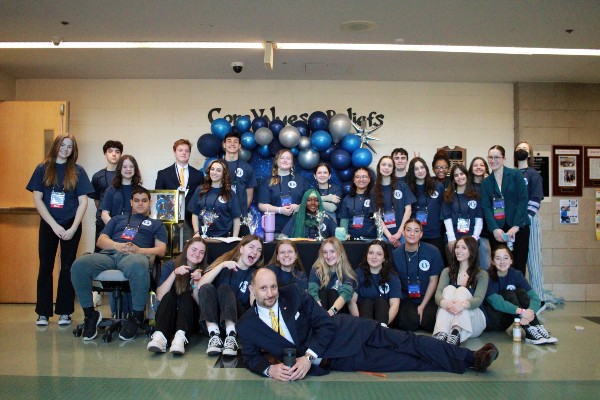A column by Lindsay Hawthorne
The message against bullying and cyber-bullying has been drilled into the brains of Woodland students pretty thoroughly, most would agree. But one approach seems to be lacking, and I’m on a mission to fill it.
A few weeks ago, the whole school sat in the auditorium and listened as a prosecuting lawyer told them horror stories of what happens to kids who act inappropriately online: they get kicked out of college for posting that they got drunk, they get sued for libeling a company, they get arrested for bullying.
But one side of this presentation seemed to be completely lost on the majority of the students: that these things actually do happen. The girl sitting behind me during this presentation was talking throughout it, commenting on how stupid all these people must be.
When the guest speaker got to the issue of cyber-bullying, he told a story of a girl whose friends posted nude photos of her on her Spring Break in College, and her little brother’s friends got hold of the photo and posted it all over his locker, haunting him with it everywhere he went. The guest speaker told how the boy wanted to commit suicide.
I don’t know whether the poor boy did commit suicide, because at that point, the lovely girl behind me said, “Good, you’re so stupid, why don’t you! Just do it!” and a few of the kids sitting with her actually laughed at this. I was so enraged by this that I missed out on much of the rest of the presentation.
I’m a teenager myself, of course, but I’ve noticed that a lot of people my age seem to think that they’re invincible. They see the stories about people who die texting while driving, but they do it anyway. They hear the stories of kids who didn’t get into college because of the things they posted online, but a lot of them do it anyway.
We seem to have this idea that we’re invincible, above everything and nothing can ever happen to us. What happened next proves my point further.
When the guest speaker got onto the topic of sexual predators on the internet, the girl behind me once again said that all those victims must be stupid.
“Everybody knows they shouldn’t post their name and address on the internet.”
Ok, Girl Behind Me. So, why do these things still happen? According to homestead.com, each year, internet predators commit over 16,000 abductions, over 100 murders and thousands of rapes. Are all these victims stupid?
The answer is no, whatever you’re thinking. Our tendency to blame the victims is something we all have to learn to overcome. We need to realize that that girl or boy on the news could have been us. We need to accept that these things really do happen, and we need to learn how to prevent them at all costs.
If you want to learn more about how to protect yourself online, and you’re willing to keep an open mind and learn things that I promise will be new to you, please come to the Media Center at Woodland on Wednesday Nov. 28th at six o’clock, where we’ll be watching clips from a shocking documentary, hearing from guest speaker State Trooper Sam McCord, and having a discussion on this controversial topic.
- One in five U.S. teenagers who regularly log on to the Internet say they have received an unwanted sexual solicitation via the Web. Solicitations were defined as requests to engage in sexual activities or sexual talk, or to give personal sexual information.
– Crimes Against Children Research Center - 25% of children have been exposed to unwanted pornographic material online.
– Crimes Against Children Research Center - Only 1/3 of households with Internet access are actively protecting their children with filtering or blocking software.
– Center for Missing and Exploited Children - 75% of children are willing to share personal information online about themselves and their family in exchange for goods and services.
– eMarketer - Only approximately 25% of children who encountered a sexual approach or solicitation told a parent or adult.
– Crimes Against Children Research Center - One in 33 youth received an aggressive sexual solicitation in the past year. This means a predator asked a young person to meet somewhere, called a young person on the phone, and/or sent the young person correspondence, money, or gifts through the U.S. Postal Service.
– Your Internet Safety Survey - 77% of the targets for online predators were age 14 or older. Another 22% were users ages 10 to 13.
– Crimes Against Children Research Center
Statistics from sentrypc.com



















